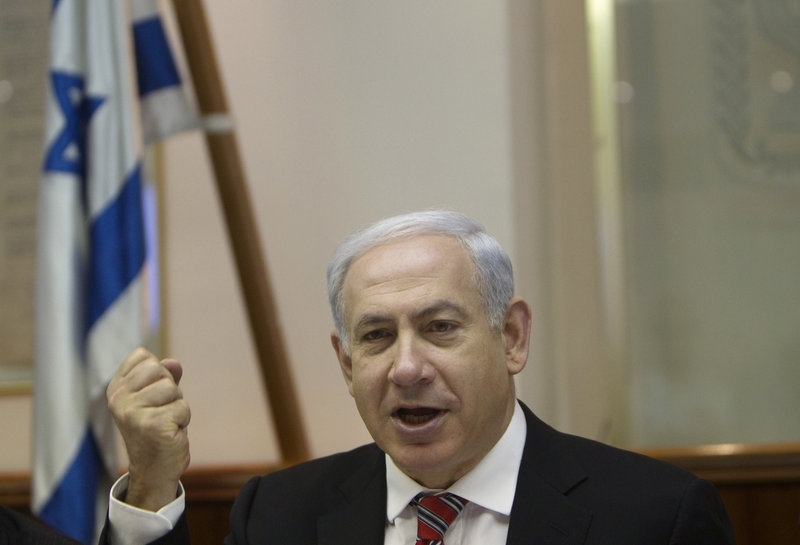JERUSALEM – In a political development with global implications, Prime Minister Benjamin Netanyahu on Sunday signaled he soon might call early elections — a decision that could put Mideast peace efforts on hold for months and cast more uncertainty on Israel’s deliberations over whether to attack Iran’s nuclear program.
Netanyahu has presided over an awkwardly diverse yet unusually resilient coalition for three years and is suddenly beset by challenges. But while he is increasingly under fire for his handling of Iran and the Palestinians, it is more mundane domestic complications that appear to be driving the coalition unrest.
The Supreme Court has ordered the government to dismantle illegal West Bank settlement outposts — a move that faces tough opposition from hard-line coalition allies who have a history of toppling even right-leaning governments like Netanyahu’s over such issues.
NETANYAHU’S CHANCES LOOK GOOD
A Supreme Court-ordered Aug. 1 deadline to scrap draft exemptions for tens of thousands of religious seminary students — an issue dividing the country’s Jews into increasingly antagonistic camps — also threatens the coalition.
Mass protests also are expected for the second summer in a row over Israel’s high cost of living.
If balloting is held soon, Netanyahu’s chances of re-election seem good — a remarkable situation given the sour national mood, the threat of regional war, and the forces arrayed against him. Israel’s own elites and the world community seem largely united in preferring his demise.
The government’s term can last through October 2013 — but Israeli governments rarely serve a full term.
An Israeli official said Netanyahu would consult with coalition partners in the next week before deciding on a new date.
The official said Netanyahu’s main concern was that his partners would make excessive budget demands for 2013 and quoted him as saying he wouldn’t cave in to “extortion.” The official spoke on condition of anonymity because he was discussing a closed meeting.
Netanyahu also told leading members of his Likud Party that he was weighing the possibility, and early elections were the focus of media reports and talk shows all day. Israel’s respected Channel 10 TV cited unidentified official sources as saying elections would take place within six months.
The opposition “will be ready for elections in October,” said Shaul Mofaz, a former military chief recently elected to head Kadima, the largest opposition party.
MORE IMMEDIATE THREATS
With the budget season months away, Netanyahu faces more immediate threats. The Supreme Court has ordered the government to dismantle an illegally built West Bank settlement outpost by Tuesday. Pro-settlement lawmakers have warned an evacuation of the Ulpana outpost could bring down the coalition. Netanyahu has asked the court for a delay.
Even if he weathers that crisis, he faces a far larger battle over the religious draft exemptions. The exemptions have long enraged Israel’s secular majority, whose young men and women serve years of mandatory military service while ultra-Orthodox men participate instead in government-subsidized religious studies.
Many continue studies for years, leading to expanding ultra-Orthodox dependence on welfare. The animosities grow daily, with increasing friction over ultra-Orthodox demands such as gender segregation in some situations.
Netanyahu’s two largest coalition partners, the ultra-Orthodox Shas party and the secular Yisrael Beitenu group, are deeply at odds over the exemptions. Losing either party would rob him of his parliamentary majority.
COALITION SPLIT ON EXEMPTIONS
Shas officials said Sunday they are not afraid of new elections over the issue. “It is delusional to think you can impose such a drastic and substantial social maneuver on an entire segment of the population,” said Nissim Zeev, a Shas lawmaker.
Yisrael Beitenu’s leader, Foreign Minister Avigdor Lieberman, threatened this weekend to bring down the government if a compromise isn’t found. He said he would submit May 9 a proposal for no more than 1,000 exemplary religious scholars to be granted exemptions.
“Our commitment to the coalition has ended. Now we have a commitment to the voter,” Lieberman said Sunday.
Netanyahu met Sunday with a group of army reservists and promised the existing law would be replaced by a more “just and egalitarian law that would more fairly divide the burden among all Israeli citizens.”
Send questions/comments to the editors.



Success. Please wait for the page to reload. If the page does not reload within 5 seconds, please refresh the page.
Enter your email and password to access comments.
Hi, to comment on stories you must . This profile is in addition to your subscription and website login.
Already have a commenting profile? .
Invalid username/password.
Please check your email to confirm and complete your registration.
Only subscribers are eligible to post comments. Please subscribe or login first for digital access. Here’s why.
Use the form below to reset your password. When you've submitted your account email, we will send an email with a reset code.